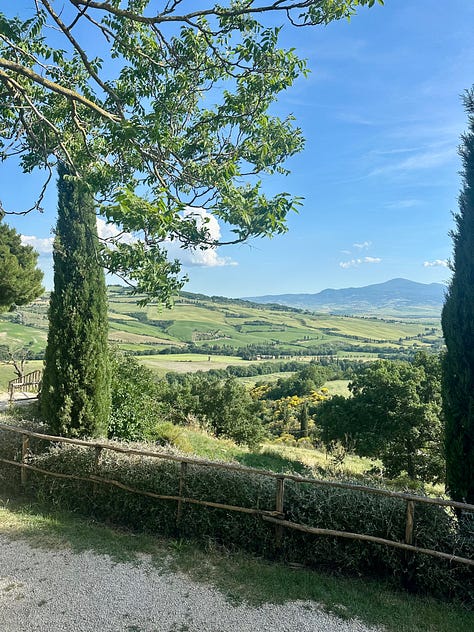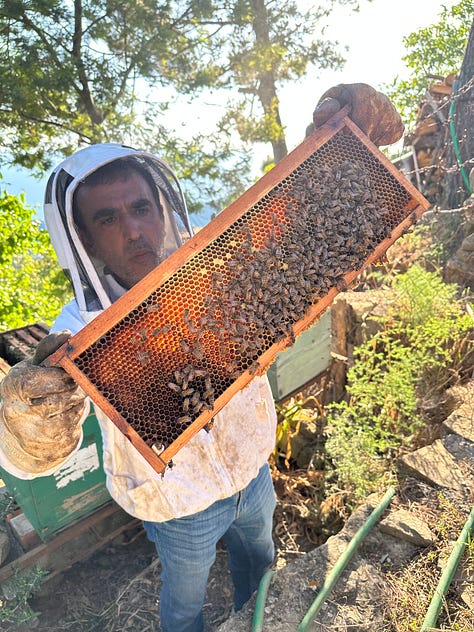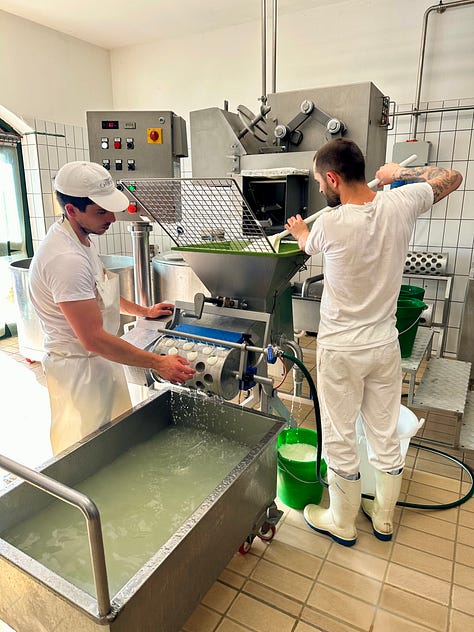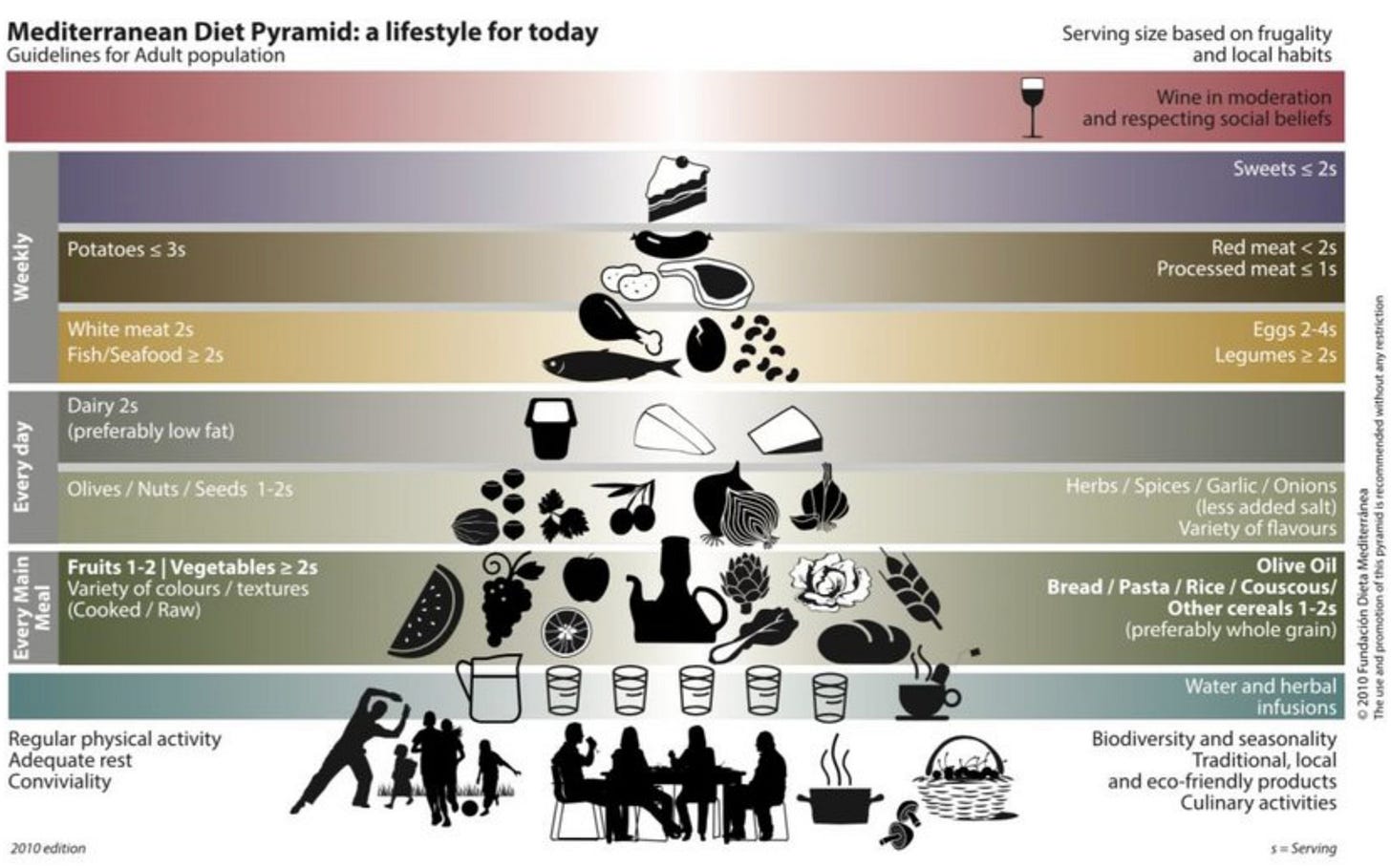notes from Italy (part one): the Mediterranean diet
Unraveling several weeks in Italy immersed in studying food and nutrition in the context of one of the healthiest diets in the world: the Mediterranean diet
After 3.5 weeks in Italy, I am back at my writing desk, working to sort out all my thoughts and what I learned. I spent the majority of that time studying food and nutrition in the context of the Mediterranean diet, having the privilege to meet with nutritionists, farmers, policy makers and more. I’ll be spending the next several weeks writing about what I learned so if you love a bit of travel content sprinkled in with your food and nutrition content, you’re in luck!
I’ll go in depth on a variety of topics in future posts but for now, let’s start with the basics…






The Mediterranean Diet - More than a Fad
Let’s get this out of the way first: in this context, a diet is not a restrictive meal plan. The etymology of the word “diet” originates from the Greek diaita, originally "way of life, regimen, dwelling," related to diaitasthai "lead one's life," and from diaitan, originally "separate, select" (food and drink). Essentially, it’s one’s holistic lifestyle, of which food is one part.
So what, exactly, is it?
The Mediterranean diet stems from a pattern of eating and living, originating from cultures among the countries surrounding the Mediterranean Sea (think Italy, Morocco, Greece…). As alluded to above, it is important to note that cultural aspects of the meal such as cooking, taking your time to eat, and enjoying a meal with loved ones, are also key features. So is including physical activity and rest. If you look below, you can see the visualization of this diet as a lifestyle, not simply a meal plan (looking at you, MyPlate).
The Traditional Mediterranean Diet
In a nutshell - the key framework of this lifestyle is as follows:
Eating primarily plant based foods, such as fruits and vegetables, whole grains, legumes and nuts
Eating foods that are local (mostly) and seasonal
Replacing butter with healthy fats such as good quality olive oil
Using herbs and spices instead of salt to flavor foods
Limiting red meats and eating those that grazed on grass
Eating fish a couple of times a week, prioritizing wild fish that consume plant matter, algae
Consuming dairy products in moderation
Eating mostly whole foods: not processed
Consuming very little added sugars; fresh fruit for dessert
Sitting down to enjoy meals with family and friends
Drinking red wine in moderation (optional) with meals
Getting plenty of physical activity
I’ll be diving into a handful of these more over the next few weeks, particularly why they’re critical from a nutrition, health, and longevity perspective. For example, I learned SO much about olive oil and its health benefits that I’m excited to put into writing for my own synthesis and to share.
Why is this diet important?
The concept of the Mediterranean diet was not coined until American physiologist Ancel Keys studied and determined that there is a relationship between lifestyle diet and health. Keys and his wife, Margaret, conducted studies in Southern Italy in the 1960s as that part of Italy had the highest number of centenarians in the world. I had the privilege of visiting the town where the Keyses conducted their studies that highlighted both physical activity and a plant-rich diet as having huge positive impacts on health and longevity. Findings were first released in 1975 but did not gain mainstream popularity until the 1990s.
This work later led to the Seven Country Study, which was designed to assess rates of coronary disease in populations and individuals and how they would vary in relation to their physical characteristics and lifestyle, particularly in fat composition of the diet and serum cholesterol levels. The countries studied were the USA, Italy, Japan, Greece, The Netherlands, Yugoslavia, and Finland. This pioneering study changed how people know and research food and health still to this day. The researchers including Ansel Keys, documented that “dietary patterns in the Mediterranean and in Japan in the 1960s were associated with low rates of coronary heart disease and all-cause mortality. The studies in the elderly showed that a healthy diet and lifestyle (sufficient physical activity, non-smoking and moderate alcohol consumption) also is associated with a low risk of cardiovascular disease and all-cause mortality. A healthy diet and sufficient physical activity may also postpone cognitive decline and decrease the risk of depression.” You can read more about this study here.
Since Ansel Keys passed in 2004 at 100 years old, a centenarian himself, more and more research continues to corroborate and expand upon his findings. According to this study published in 2017:
“Consuming a Mediterranean diet rich in minimally processed plant foods has been associated with a reduced risk of developing multiple chronic diseases and increased life expectancy. Data from several randomized clinic trials have demonstrated a beneficial effect in the primary and secondary prevention of cardiovascular disease, type 2 diabetes, atrial fibrillation, and breast cancer.”
While from a food policy and production standpoint, we have a ways to go (certainly in the United States) to exemplify Keys’ research, my goal here is to share what I learned along the way from my own and other’s research so that we can all take these findings to live healthier, higher quality lives. I’m excited to dive into the last few weeks as I being to wrap my head around all that I learned and thrilled to have you along the way with me.
Thanks for reading! Let me know what you want to see more of particularly as it pertains to Italy and my research travels there. Drop a comment below.





